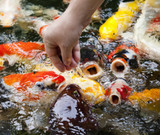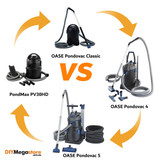Essential Tips for Feeding Your Koi Fish
For many pond owners, having koi fish is the main reason for creating a water feature. Whether you’re expanding your aquarium hobby outdoors or simply adding a beautiful touch to your water garden, koi fish provide years of enjoyment. As you grow fond of your koi, you’ll realize they need proper nutrition, just like any pet. Here’s what you need to know about feeding koi fish.
To Feed or Not to Feed
Feeding koi fish can be a fun activity for the whole family. When you first bring your koi home, they may be shy and hesitant to eat. Be patient, sprinkle a little food, and give them time to adjust. Consistency is key—feed them at the same time and place daily to condition them to your visits.
Always feed your koi high-quality koi fish food designed specifically for pond fish. Low-quality food can lead to water quality issues like green water and string algae. Be mindful not to overfeed as uneaten food can disrupt the pond's ecosystem.
The Five-Minute Rule
A good rule of thumb is to only feed your koi what they can eat in five minutes. Your pond naturally produces food for your fish, but larger koi may need more and could start nibbling on your plants if underfed. Feeding koi fish not only ensures their health but also adds to the enjoyment of your pond.
Choosing the Best Koi Fish Food
Studies show that fish proteins are best digested and assimilated by koi. When choosing koi fish food, the first ingredient should be fish or other aquaculture proteins. Plant proteins are also beneficial when combined with fish proteins, providing fiber and carbohydrates. For the best results, choose Porpoise Koi Fish Food, formulated with high-quality ingredients to ensure your koi thrive and display vibrant colors.
Assessing an Ingredient Label (Understanding fish food labels is crucial):
- Protein Source: Look for blood meal, fish meal, squid meal, shrimp meal, or herring meal.
- Purpose of Plant Material: Plant proteins should supplement fishmeal, not replace it.
- Protein Percentage: Ideal protein content is between 32-36%.
- Fat Content: Should be between 3-10%, higher for smaller fish.
- Ascorbic Acid: Essential for fish health.
- Immune Boosters: Ingredients like beta carotene and brewer’s yeast are beneficial.
- Color Enhancers: Look for spirulina, shrimp oil, and other carotenoids.
- Ash Content: Indicates the non-digestible residue in the food.
Conclusion
Your koi fish rely on you for proper nutrition. Learning how to choose the best koi fish food, the right feeding times, and appropriate treats will ensure your koi stay healthy and vibrant. Enjoy the process and the beauty of your thriving pond for years to come. For optimal koi health and brilliant colors, trust Porpoise Koi Fish Food.
Recent Posts
-
Koi Fish Food: The Ultimate Guide for Australian Koi Keepers
Koi Protein Requirements: Complete Nutrition Guide for Australian Koi Keepers Understanding what yo …14th Nov 2025 -
Ready to Build Your Dream Water Walls?
Your water walls transformation starts with the right supplies and expert guidance. Share your water …18th Sep 2025 -
Best Pond Vacuums Compared: PondMAX PV30HD vs OASE PondoVac Classic, 4 & 5
Keeping your pond clean isn't just about aesthetics—it's essential for fish health, water clarity, a …7th Jul 2025




